Richard Maxfield / Harold Budd, "The Oak of the Golden Dreanms" & Charlemagne Pasestine, "In Mid Air
- Administrator
- Albums and Singles
Alga Marghen
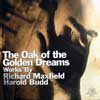 The truth regarding the history of minimalism and American experimentalmusic from the 60s is, despite the best efforts of certainmusicologists and writers, becoming much more widely know. As it does,more and more labels get in on the game of releasing the archivalrecordings that document the history better that any text can. Thesetwo CDs are part of this revisionism. Maxfield was older than most ofthe 60s pioneers; he had his grounding in the academy, ambitions ofbeing a composer of serious music, and access to the space and musicianresources of the classical world. He was pretty much ready to roll whenCage hit the scene. But his music, as presented here in these fourworks from 1960 to 63, is immediate, effective and without the need oftheoretical crutches. Each of these pieces can be seen as inventiveAmerican responses to develoments in the European avant-garde: Pastoral Symphonyto 18's electronic music but with the major difference of having beencontinuously synthesized (on which synth I wonder?) rather than splicedtogether; Bacchanale to Schaeffer's and Henry's musique concrète here incorporating beat poetry, jazz and narrative; Piano Concert for David Tudor, combining tape music with live piano, to Stockhausen's Kontakte (1960 version) with similarly unexpected and dramatic results; and finally Amazing Grace,based as it is on repetitive tape loops, being the most intrinsicallyAmerican of all. Maxfield's valuable and underrated work was ended in1969 when he died, a casualty of 60s drug culture. Harold Budd's musicis much less to my taste. I never put much effort into exploring hismusic since none of it ever caught my fancy but Budd's place in theworld of ambient and spiritualized meditative music is obviously one ofintegrity. The Oak of the Golden Dreams catches Buddimprovising bagpipe music on the Buchla synth in 1970, a twiddley modalchanter line over a continuous E flat drone (but it's probably relevantthat I grew up in Scotland to hate bagpipes). Coeur D'Orr hasessentially the same structure: two organ chords, D flat major on theright channel and B major on the left, sit there shimmering andswelling while Charles Oreña noodles a highly expressionist and attimes decidedly jazzy (Coltrane rather than Paul Desmond) line on thesoprano sax. Initially (the sax only comes in in the third minute) theresemblance to Charlemagne Palestine's organ music is obvious. But herethe organ is static and not central, functioning as a bed for melodicimprovisation within the static harmonic sound shape. Thecorrespondence to, say, Frank Zappa's guitar noodling within staticstructures, e.g. 'Ship Ahoy', is more accurate. Such overtly happy(hippy?) music isn't my bag but if you dig Budd these are surely twoimportant documents.
The truth regarding the history of minimalism and American experimentalmusic from the 60s is, despite the best efforts of certainmusicologists and writers, becoming much more widely know. As it does,more and more labels get in on the game of releasing the archivalrecordings that document the history better that any text can. Thesetwo CDs are part of this revisionism. Maxfield was older than most ofthe 60s pioneers; he had his grounding in the academy, ambitions ofbeing a composer of serious music, and access to the space and musicianresources of the classical world. He was pretty much ready to roll whenCage hit the scene. But his music, as presented here in these fourworks from 1960 to 63, is immediate, effective and without the need oftheoretical crutches. Each of these pieces can be seen as inventiveAmerican responses to develoments in the European avant-garde: Pastoral Symphonyto 18's electronic music but with the major difference of having beencontinuously synthesized (on which synth I wonder?) rather than splicedtogether; Bacchanale to Schaeffer's and Henry's musique concrète here incorporating beat poetry, jazz and narrative; Piano Concert for David Tudor, combining tape music with live piano, to Stockhausen's Kontakte (1960 version) with similarly unexpected and dramatic results; and finally Amazing Grace,based as it is on repetitive tape loops, being the most intrinsicallyAmerican of all. Maxfield's valuable and underrated work was ended in1969 when he died, a casualty of 60s drug culture. Harold Budd's musicis much less to my taste. I never put much effort into exploring hismusic since none of it ever caught my fancy but Budd's place in theworld of ambient and spiritualized meditative music is obviously one ofintegrity. The Oak of the Golden Dreams catches Buddimprovising bagpipe music on the Buchla synth in 1970, a twiddley modalchanter line over a continuous E flat drone (but it's probably relevantthat I grew up in Scotland to hate bagpipes). Coeur D'Orr hasessentially the same structure: two organ chords, D flat major on theright channel and B major on the left, sit there shimmering andswelling while Charles Oreña noodles a highly expressionist and attimes decidedly jazzy (Coltrane rather than Paul Desmond) line on thesoprano sax. Initially (the sax only comes in in the third minute) theresemblance to Charlemagne Palestine's organ music is obvious. But herethe organ is static and not central, functioning as a bed for melodicimprovisation within the static harmonic sound shape. Thecorrespondence to, say, Frank Zappa's guitar noodling within staticstructures, e.g. 'Ship Ahoy', is more accurate. Such overtly happy(hippy?) music isn't my bag but if you dig Budd these are surely twoimportant documents.  Andso to the Palestine CD which presents five slices of his electronicdrone music recorded between 1967 and 1970. Palestine's innatepredilection for evolving static sounds, transcendental drones andspiritual elevation was evident well before he first had access to thesynthesizers that allowed real-time manipulation of additive (combiningdifferent tones) and subtractive (filtering) synthesis. Thepossibilities for improvised drone music were obvious and he eventuallyhad a custom machine built for this purpose with 16 ultra-stableoscillators from Serge Tcherepnin and 4 band pass filters from DonaldBuchla. The five pieces here, all subtitled Late Night Electronic Sonority,are snapshots from his "spectral continuum searches for the goldensonority—day, week, month long journeys of harmonies and theirovertones in constant evolution in time and transformation in space."The music is heavy with tension, balanced somewhere between fear,existential question and the possibility of hope; glistening,shimmering and perfectly judged. It's a remarkable achievement thatPalestine originated this approach to music, the instrument design andits musical practice, performed these masterful improvisations,inspired a whole generation of musicians and wound up as a merefootnote, if that, in the history of minimalism. Take those PhillipGlass and John Adams disks down to the thrift store and get abordminimalism's revisionist revolution; apart from being more authentic,the real stuff is of infinitely superior taste and actually has a soul.
Andso to the Palestine CD which presents five slices of his electronicdrone music recorded between 1967 and 1970. Palestine's innatepredilection for evolving static sounds, transcendental drones andspiritual elevation was evident well before he first had access to thesynthesizers that allowed real-time manipulation of additive (combiningdifferent tones) and subtractive (filtering) synthesis. Thepossibilities for improvised drone music were obvious and he eventuallyhad a custom machine built for this purpose with 16 ultra-stableoscillators from Serge Tcherepnin and 4 band pass filters from DonaldBuchla. The five pieces here, all subtitled Late Night Electronic Sonority,are snapshots from his "spectral continuum searches for the goldensonority—day, week, month long journeys of harmonies and theirovertones in constant evolution in time and transformation in space."The music is heavy with tension, balanced somewhere between fear,existential question and the possibility of hope; glistening,shimmering and perfectly judged. It's a remarkable achievement thatPalestine originated this approach to music, the instrument design andits musical practice, performed these masterful improvisations,inspired a whole generation of musicians and wound up as a merefootnote, if that, in the history of minimalism. Take those PhillipGlass and John Adams disks down to the thrift store and get abordminimalism's revisionist revolution; apart from being more authentic,the real stuff is of infinitely superior taste and actually has a soul.- Maxfield - Pastoral Symphony
- Maxfield - Bacchanale
- Budd - The Oak of the Golden Dreams
- Palestine - Open-Closing
- Palestine - Tymbral for Pran Nath
Read More
- Administrator
- Albums and Singles
 Following up an EP released a couple years back, Stereolab bassistSimon Johns has assembled the first full-length from his project. Theband consists of fantastic players, utilizing a wide spectrum ofinstruments and honing a driving sound most Stereolab fans could easilylatch on to. However, as I enjoyed the brevity of the other EP, as anLP, there's simply something missing. While the music is pleasant andenjoyable, most of the songs don't really progress far from their entrypoint. In addition, with the lack of melodic variety and the frequentdroning of single note playing, all the tracks makes this ensemblesound almost too "jam-band-y" for my own personal tastes. For the mostpart, it never quite gets offensive, that is until the "Theme for anImitation Electric Piano," with the atrocious "Rockin' and rollin' /the theme for an imitation electric piano" lyrics. Getting through theentire album just isn't as rewarding as a short 5-track EP of stuffthat gets in late and gets out early. If the eponymous EP gave thefeeling of a tap, slap, and run, Trinity Neon is a wait, get impatient and give up kinda feel, which, at best can serve as decent aural wallpaper.
Following up an EP released a couple years back, Stereolab bassistSimon Johns has assembled the first full-length from his project. Theband consists of fantastic players, utilizing a wide spectrum ofinstruments and honing a driving sound most Stereolab fans could easilylatch on to. However, as I enjoyed the brevity of the other EP, as anLP, there's simply something missing. While the music is pleasant andenjoyable, most of the songs don't really progress far from their entrypoint. In addition, with the lack of melodic variety and the frequentdroning of single note playing, all the tracks makes this ensemblesound almost too "jam-band-y" for my own personal tastes. For the mostpart, it never quite gets offensive, that is until the "Theme for anImitation Electric Piano," with the atrocious "Rockin' and rollin' /the theme for an imitation electric piano" lyrics. Getting through theentire album just isn't as rewarding as a short 5-track EP of stuffthat gets in late and gets out early. If the eponymous EP gave thefeeling of a tap, slap, and run, Trinity Neon is a wait, get impatient and give up kinda feel, which, at best can serve as decent aural wallpaper.Read More
- Administrator
- Albums and Singles
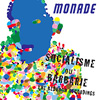 The first exposure to the lead singer of Stereolab, Laetitia Sadier's solo project Monade came on a split single with M (later known as Aerial M and currently Papa M). The music was unobtrusive, peaceful, and serene, much unlike the intense sounds Stereolab were notorious for. Finding Monade music was always a treat, whether it was on an obscure 7" single or a split release.
The first exposure to the lead singer of Stereolab, Laetitia Sadier's solo project Monade came on a split single with M (later known as Aerial M and currently Papa M). The music was unobtrusive, peaceful, and serene, much unlike the intense sounds Stereolab were notorious for. Finding Monade music was always a treat, whether it was on an obscure 7" single or a split release.
Through these relatively quiet releases, the availability and market flood of Monade music has been quite low key, much like the music. Stripped down to very basic elements of guitar, vocals, and the occasional organs and percussion, Monade music is perfect for a lazy sunny afternoon. This, the first full-length album, captures pretty much everything previously released (with songs only slightly expanded in a couple cases) and some previously unreleased material. Sadier's voice, which is most typically backed by a host of horns, intense drums, and a plethora of rock instruments sounds wonderful up against the simple guitars which could have easily been recorded in the inbetween times, in bedrooms, away from the grandeur of large studios and major label budgets. At a time where I think the current status of Stereolab might be a little bit tender after the untimely loss of Mary Hansen, an album like this is a fantastic gift to have, to cherish, and take an introspective moment with. At 12 tracks, the 45 minutes passes very quickly, and it never loses its charm with continuous repeats.
Read More
- Administrator
- Albums and Singles
 Touted by just about every publication as being one of the next bestthings, The Stratford 4 leave a lot to be desired on this, their secondfull-length. Equally influenced it seems by My Bloody Valentine, TheCure, and scores of Brit-pop bands, their music is delayed anddistorted guitars with a pop sensibility. Officially, I would like tosay that this sound is going to take them absolutely nowhere unlessthey can improve the juvenile lyric-writing. The music is just fine,imploring pleasant melodies, grooving basslines, and lots of effectsthat make the guitars swirl and shriek behind them. Unfortunately, whatcomes to the forefront is just plain awful. "I went to confession but Ihad nothing to confess. They said what's wrong with you? You're usuallysuch a mess" is almost as bad as "If you want to kiss my mouth, tell mewhat it's all about, if you want to climb into bed with your delicatehead than that would be alright." This is a study in how to write likeDamon Albarn, with a great sense at times of what good music is, but nograsp whatsoever of poetry or prose. This music could stand a bit ofvariation, too, as it seems every song says what it's supposed to inthe first three minutes, then jams out a bit for the rest; or it jams abit in the beginning to build to the proper idea, then soars outtowards the end. The first song on the album, "Where the Ocean Meetsthe Eye," is the only one that shows promise in this sound, with quietbass joining chiming delayed guitars and slightly echoed drums. It allgets engulfed as the flames of loud angry distortion grow higher andhigher. The vocals join in at the height of the volume, and the lyricsare wailed in such a way that they aren't always recognizable. Perfect.Let the music talk and let the lyrics be puzzled over. If they'd donethat more, it probably wouldn't be so bad.
Touted by just about every publication as being one of the next bestthings, The Stratford 4 leave a lot to be desired on this, their secondfull-length. Equally influenced it seems by My Bloody Valentine, TheCure, and scores of Brit-pop bands, their music is delayed anddistorted guitars with a pop sensibility. Officially, I would like tosay that this sound is going to take them absolutely nowhere unlessthey can improve the juvenile lyric-writing. The music is just fine,imploring pleasant melodies, grooving basslines, and lots of effectsthat make the guitars swirl and shriek behind them. Unfortunately, whatcomes to the forefront is just plain awful. "I went to confession but Ihad nothing to confess. They said what's wrong with you? You're usuallysuch a mess" is almost as bad as "If you want to kiss my mouth, tell mewhat it's all about, if you want to climb into bed with your delicatehead than that would be alright." This is a study in how to write likeDamon Albarn, with a great sense at times of what good music is, but nograsp whatsoever of poetry or prose. This music could stand a bit ofvariation, too, as it seems every song says what it's supposed to inthe first three minutes, then jams out a bit for the rest; or it jams abit in the beginning to build to the proper idea, then soars outtowards the end. The first song on the album, "Where the Ocean Meetsthe Eye," is the only one that shows promise in this sound, with quietbass joining chiming delayed guitars and slightly echoed drums. It allgets engulfed as the flames of loud angry distortion grow higher andhigher. The vocals join in at the height of the volume, and the lyricsare wailed in such a way that they aren't always recognizable. Perfect.Let the music talk and let the lyrics be puzzled over. If they'd donethat more, it probably wouldn't be so bad. Read More
- Andrew Shires
- Albums and Singles
 First issued in 2001 in a limited, card-packaged edition on the DutchBrombron label (a guise of Staalplaat, in collaboration with theNijmegen rehearsal space Extrapool), Heroin (reviewed in Brain v5i20)certainly deserves this reissue, as one of the most celebrated releasesin the microsound "genre". Now remastered, it's made even moreappealing by the addition of a CD of "extensions" of the original,provided by luminaries such as Christian Fennesz, Nobukazu Takemura,Kit Clayton, Akira Rabelais, Freiband, and Oren Ambarchi. Theremastering gives a slightly crisper sound, particularly in the highfrequencies, helping to emphasise the album's digitally processed feel.Yet this doesn't detract from the engaging warmth of the original,whose shimmering, looped phrases produce a diverting emotionalconnection. Its 13 tracks are often touching, humourous, or both, as inthe heavily processed "Turkey Song," which makes a new Christmasclassic out of the music from Peanuts cartoons. The"extensions" themselves appear to be either remixes or attempts totouch on similar musical ground. Takemura's skittering, high BPMworkout "Child's View," which samples "Heroique," is far from the soundof the Mathieu and Ehlers's tracks, but nonetheless excellent. Otherhighlights are the gentle avant guitar of Joseph Suchy (who worked withEhlers on the Plays series), the always enjoyable Fennesz, andCarmen Baier's edgy soundscape "Webteil." The second CD, presented bythe packaging as a second Heroin, or perhaps a part of thefirst, can only honestly be taken as a remix project, lacking thecohesion of the original. But all of the new tracks meet a highstandard, and certainly don't feel throwaway. The original stillcommands greater attention, and its appeal should cement it over timeas a minor classic of modern electronica.
First issued in 2001 in a limited, card-packaged edition on the DutchBrombron label (a guise of Staalplaat, in collaboration with theNijmegen rehearsal space Extrapool), Heroin (reviewed in Brain v5i20)certainly deserves this reissue, as one of the most celebrated releasesin the microsound "genre". Now remastered, it's made even moreappealing by the addition of a CD of "extensions" of the original,provided by luminaries such as Christian Fennesz, Nobukazu Takemura,Kit Clayton, Akira Rabelais, Freiband, and Oren Ambarchi. Theremastering gives a slightly crisper sound, particularly in the highfrequencies, helping to emphasise the album's digitally processed feel.Yet this doesn't detract from the engaging warmth of the original,whose shimmering, looped phrases produce a diverting emotionalconnection. Its 13 tracks are often touching, humourous, or both, as inthe heavily processed "Turkey Song," which makes a new Christmasclassic out of the music from Peanuts cartoons. The"extensions" themselves appear to be either remixes or attempts totouch on similar musical ground. Takemura's skittering, high BPMworkout "Child's View," which samples "Heroique," is far from the soundof the Mathieu and Ehlers's tracks, but nonetheless excellent. Otherhighlights are the gentle avant guitar of Joseph Suchy (who worked withEhlers on the Plays series), the always enjoyable Fennesz, andCarmen Baier's edgy soundscape "Webteil." The second CD, presented bythe packaging as a second Heroin, or perhaps a part of thefirst, can only honestly be taken as a remix project, lacking thecohesion of the original. But all of the new tracks meet a highstandard, and certainly don't feel throwaway. The original stillcommands greater attention, and its appeal should cement it over timeas a minor classic of modern electronica.Read More
- Administrator
- Albums and Singles
 The alternative country sound seems to get no respect anymore, as itnever really achieved any of the goals it was going for. There arepublications dedicated to it, sure, and records come out all the timefor its stalwarts like Ryan Adams and the Jayhawks; but alt-country, asit is often called, never revolutionized country music, and its artistsare still not widely recognized by mainstream country. With theexception of bands like Nickel Creek doing a Stephen Malkmus song ontheir last album or Johnny Cash doing Soundgarden or Nine Inch Nails,it also seems to have lost some of its alternative edge. That's allabout to change with the arrival of Kathleen Edwards. For me, thepinnacle of the alt-country sound was Whiskeytown, the band Ryan Adamshad with Caitlin Cary until 2000. They had it all: beautiful harmonies,great hooks, and songs about booze and heartache. Edwards continuestheir sound on the first song on Failer,then promptly blows it the hell away. She even plays violin, like Carydid in Whiskeytown, adding a sadness or playfulness to certain songs,just to get the right feeling in the right place. Her sound is at onceclassic and new, her voice is assured and insecure, the songs perfectand uneven. She's also quite aware of the difficulties of selling hersound, as she states nicely in "One More Song the Radio Won't Like,"and on songs like "Six O'Clock News" and "Hockey Skates" you wonder whythe mainstream press won't just eat it up at the same time that youhope they won't. Even though there seems to be a preoccupation withbooze and bars in her music, they're not bad things for a country starto be singing about, though it seems there are more weaknesses Edwardscould be exploring. She hints at big ones in small mentions, aboutbabies coming in June, and how she can't seem to do anything right.Every time it comes right back to tipping a glass/bottle or, on onesong at least, getting high. Mostly, though, the whole album has a feelabout getting out. Maybe Edwards will break out with this record, but Ihope she doesn't lose sight of this desperation and sadness. It's worthmuch more even it means no one will hear it.
The alternative country sound seems to get no respect anymore, as itnever really achieved any of the goals it was going for. There arepublications dedicated to it, sure, and records come out all the timefor its stalwarts like Ryan Adams and the Jayhawks; but alt-country, asit is often called, never revolutionized country music, and its artistsare still not widely recognized by mainstream country. With theexception of bands like Nickel Creek doing a Stephen Malkmus song ontheir last album or Johnny Cash doing Soundgarden or Nine Inch Nails,it also seems to have lost some of its alternative edge. That's allabout to change with the arrival of Kathleen Edwards. For me, thepinnacle of the alt-country sound was Whiskeytown, the band Ryan Adamshad with Caitlin Cary until 2000. They had it all: beautiful harmonies,great hooks, and songs about booze and heartache. Edwards continuestheir sound on the first song on Failer,then promptly blows it the hell away. She even plays violin, like Carydid in Whiskeytown, adding a sadness or playfulness to certain songs,just to get the right feeling in the right place. Her sound is at onceclassic and new, her voice is assured and insecure, the songs perfectand uneven. She's also quite aware of the difficulties of selling hersound, as she states nicely in "One More Song the Radio Won't Like,"and on songs like "Six O'Clock News" and "Hockey Skates" you wonder whythe mainstream press won't just eat it up at the same time that youhope they won't. Even though there seems to be a preoccupation withbooze and bars in her music, they're not bad things for a country starto be singing about, though it seems there are more weaknesses Edwardscould be exploring. She hints at big ones in small mentions, aboutbabies coming in June, and how she can't seem to do anything right.Every time it comes right back to tipping a glass/bottle or, on onesong at least, getting high. Mostly, though, the whole album has a feelabout getting out. Maybe Edwards will break out with this record, but Ihope she doesn't lose sight of this desperation and sadness. It's worthmuch more even it means no one will hear it.Read More
- Administrator
- Albums and Singles
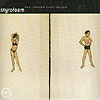 It's quite strange to imagine that there could now very well be ageneration of electronic-based musicians/artists who never sat forhours practicing scales, modes, chords, rhythms, what have you, on anactual instrument. Since the laptop revolution has brought aboutpractically every instrumental sound under the sun for consumption,there's not really a great need to sit with a chunk of wood or brass.Not that I don't favor electronic-based music or the musicians who makeit, but hearing additional sounds that were actually in the ether atsome point before being committed to tape (sorry, hard disk) makes fora refreshing change now and again. I'm What's There to Show That Something's Missing,the latest release from Belgian native Arne van Petegem (aka Styrofoam)enjoyably blends the glitch-type Powerbook beats and sounds with thelive element of prominent vocals and acoustic guitar at times for aninteresting take on modern pop music. "The Long Wait" opens the discwith the arpeggiations of said guitar and builds into a laid backgroove of electronic beats and keyboards that gradually thickens withsome synth bass while van Petegem's lush vocal layers deliver both acatchy melody and lyrics. The more pop-oriented "A Heart Without AMind" skips along to a wall of synth flourishes with the bass line andvocals leading the progressions until guitar and keyboards take over.The opening tape shuttle sounds of the more electronic "Forever, YouSaid Forever" drop out for some sparse keyboards and linear drummachine rhythms to provide the backing track for a sampled conversationof a couple that are in the midst of an arguement over a break-up. Thedisc's eight tunes are well crafted and arranged to highlight vanPetegem's skills as both a programmer and guitar player/vocalist byaugmenting the former with the latter. While this particular formulafor the laptop set is nothing new, Styrofoam's take on it makes for amore animated disc with the likeness of a full band.
It's quite strange to imagine that there could now very well be ageneration of electronic-based musicians/artists who never sat forhours practicing scales, modes, chords, rhythms, what have you, on anactual instrument. Since the laptop revolution has brought aboutpractically every instrumental sound under the sun for consumption,there's not really a great need to sit with a chunk of wood or brass.Not that I don't favor electronic-based music or the musicians who makeit, but hearing additional sounds that were actually in the ether atsome point before being committed to tape (sorry, hard disk) makes fora refreshing change now and again. I'm What's There to Show That Something's Missing,the latest release from Belgian native Arne van Petegem (aka Styrofoam)enjoyably blends the glitch-type Powerbook beats and sounds with thelive element of prominent vocals and acoustic guitar at times for aninteresting take on modern pop music. "The Long Wait" opens the discwith the arpeggiations of said guitar and builds into a laid backgroove of electronic beats and keyboards that gradually thickens withsome synth bass while van Petegem's lush vocal layers deliver both acatchy melody and lyrics. The more pop-oriented "A Heart Without AMind" skips along to a wall of synth flourishes with the bass line andvocals leading the progressions until guitar and keyboards take over.The opening tape shuttle sounds of the more electronic "Forever, YouSaid Forever" drop out for some sparse keyboards and linear drummachine rhythms to provide the backing track for a sampled conversationof a couple that are in the midst of an arguement over a break-up. Thedisc's eight tunes are well crafted and arranged to highlight vanPetegem's skills as both a programmer and guitar player/vocalist byaugmenting the former with the latter. While this particular formulafor the laptop set is nothing new, Styrofoam's take on it makes for amore animated disc with the likeness of a full band.Read More
- Administrator
- Albums and Singles
 There's a long list of albums with titles that are misnomers for the music inside. With Summer Sun,Yo La Tengo are pretty close to adding another to the list. Severaltracks interspersed save the album from this category by shining alittle light in, though the band generally gets mired in theirexquisitely somber sound, which is a very good thing. Album afteralbum, Yo La Tengo produce quality music with impressive productionvalues, and this album is no different. The proceedings start, as morethan one Yo La Tengo album has, with an instrumental of sorts, and"Beach Party Tonight" is a clear indication that the electronic side ispossessing the band more and more on each release. The whole albumfeatures more technology, and these additions lend a lot to the generalaura of the music without being intrusive. Ira Kaplan's vocals arefrequently hushed, as usual, and on "Beach Party," they're almostincomprehensible, bringing the music to the forefront. Georgia Hubleyis coming into her own vocally, sounding more and more like thechanteuse that's been hiding away. "Little Eyes" is a perfect power popproduction, much like the more mainstream fair of I Can Hear the Heart Beating as One.Elsewhere the tradition of one epic song per album continues, too, with"Let's Be Still" as this album's "Night Falls on Hoboken," and it's abit more coherent and a bit more freeform than before. One thing thatthe title suggests clearly, though, is that Yo La Tengo were out tohave a lot more fun this time, and it shows on tracks like "Georgia vs.Yo La Tengo," an almost '70s porn anthem laden with effects and funkpiano, and on "Winter A-Go-Go", which could almost pass for Steve andEydie. Even though there's more sun in the sky, there's always shadowscast, and that's what they thankfully couldn't avoid. Summer Sunis not their best work, but it is another solid album from a band notafraid to expand their sound, take chances or let loose every now andthen.
There's a long list of albums with titles that are misnomers for the music inside. With Summer Sun,Yo La Tengo are pretty close to adding another to the list. Severaltracks interspersed save the album from this category by shining alittle light in, though the band generally gets mired in theirexquisitely somber sound, which is a very good thing. Album afteralbum, Yo La Tengo produce quality music with impressive productionvalues, and this album is no different. The proceedings start, as morethan one Yo La Tengo album has, with an instrumental of sorts, and"Beach Party Tonight" is a clear indication that the electronic side ispossessing the band more and more on each release. The whole albumfeatures more technology, and these additions lend a lot to the generalaura of the music without being intrusive. Ira Kaplan's vocals arefrequently hushed, as usual, and on "Beach Party," they're almostincomprehensible, bringing the music to the forefront. Georgia Hubleyis coming into her own vocally, sounding more and more like thechanteuse that's been hiding away. "Little Eyes" is a perfect power popproduction, much like the more mainstream fair of I Can Hear the Heart Beating as One.Elsewhere the tradition of one epic song per album continues, too, with"Let's Be Still" as this album's "Night Falls on Hoboken," and it's abit more coherent and a bit more freeform than before. One thing thatthe title suggests clearly, though, is that Yo La Tengo were out tohave a lot more fun this time, and it shows on tracks like "Georgia vs.Yo La Tengo," an almost '70s porn anthem laden with effects and funkpiano, and on "Winter A-Go-Go", which could almost pass for Steve andEydie. Even though there's more sun in the sky, there's always shadowscast, and that's what they thankfully couldn't avoid. Summer Sunis not their best work, but it is another solid album from a band notafraid to expand their sound, take chances or let loose every now andthen.Read More
- Administrator
- Albums and Singles
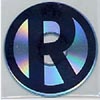 Replicator are a neat dynamic rock trio from the San Francisco Bay Area who get compared to Shellac a lot. This seems to be mostly because Shellac bassist Bob Weston records them and because they are quite vocal on the Shellac email list, which is how I happened to hear about them. To me a much better comparison would be Poster Children, but imagine how they might have ended up had they introduced the loops and synths of Salaryman into their exuberant rockpop shapes instead of separating into two different projects involving the same people.Feedback Loop Industries
Replicator are a neat dynamic rock trio from the San Francisco Bay Area who get compared to Shellac a lot. This seems to be mostly because Shellac bassist Bob Weston records them and because they are quite vocal on the Shellac email list, which is how I happened to hear about them. To me a much better comparison would be Poster Children, but imagine how they might have ended up had they introduced the loops and synths of Salaryman into their exuberant rockpop shapes instead of separating into two different projects involving the same people.Feedback Loop Industries
But enough of comparisons, Replicator have their own thing and they've built on and transcended the solid foundation of their debut album Winterval with a quartet of addictive angular rockin' bursts of hopeful angst. The EP opens with Validation Complex, a tongue in cheek spoken self help therapy session for hardcore kids, with singer / guitarist Conan Neutron reciting multi-tracked paens to the powerful foundations of confidence, before erupting into choppy oriental chord trashing. The weakest aspect of their debut was probably the vocals, and on this track they cleverly turn that into a strength with double tracked tricks. "It's a blast of utter frustration," so begins the stormin' Bawkbakawk Bawkbagone and as the day wore on the situation deteriorated but in the interests of self preservation it wasn't something they concerned themselves with, even if it had rendered their song titles nigh on incomprehensible to mere psueud mag eds. Despite such frivolity, Replicator do stop on a dime to squawk like an unruly hen or three. Their use of programmed loops has become more intrinsically organic to the songwriting process than on Winterval, and marks them high in moderninity. They never forget that their job is to rock yer ass, but like many of the best bands they realise this does not have to be a brainless shake. This EP was recorded over a year ago, and apparently the tracks have evolved somewhat and some might be reworked for the album that Replicator are currently recording. Check the label site for links to songs. It would be wonderful if they could get over to the UK for some gigs. Perhaps Bob Weston might consider them for the line up of next year's All Tomorrow's Parties? I find it amazing that a band this good has to be self releasing a CD-R. What's the matter with record labels these days?
Read More
- Administrator
- Albums and Singles
 Lately it seems Mark Eitzel has just been taking opportunities as they come. He was invited to record albums in Chicago and Athens, served a month long residency at the Knitting Factory in NYC and will soon tour Portugal and Spain. 'The Ugly American' is the result of the trip to Greece and the debut album from the UK's Tongue Master (a U.S. release date is likely for June or July via Thirsty Ear).
Lately it seems Mark Eitzel has just been taking opportunities as they come. He was invited to record albums in Chicago and Athens, served a month long residency at the Knitting Factory in NYC and will soon tour Portugal and Spain. 'The Ugly American' is the result of the trip to Greece and the debut album from the UK's Tongue Master (a U.S. release date is likely for June or July via Thirsty Ear).
Eitzel and his hosts refurbished eight of his American Music Club and solo songs spanning from 1987 to today, plus a new one and one written by producer Manolis Famellos. Fortunately it still sounds like it should: the inimitable Mark Eitzel performing his emotionally wrought song craft. Eitzel is in fine voice and the Grecians' flourishes of plucked, strummed and sweeping strings are tastefully reserved, careful to add local flavors but not to overwhelm the songs. Except maybe for "Here They Roll Down" as it's given a slightly bothersome bagpipe-like drone. Classics such as "Western Sky", "Jenny", "Nightwatchman", "Take Courage", "Will You Find Me" and "Last Harbor" are as heartbreakingly beautiful as they've always been. If nothing else, this album serves as a reminder of just how fucking great these songs are and preserves them with modern production. "Anything" from 2001's 'The Invisible Man' may very well be better than the original. The new one "What Good Is Love" and Famellos' "Love's Humming" are far from sore thumbs and delve a bit deeper into Greek drama, musically and lyrically. In the former Eitzel rhetorically asks "and if there's no way to love / the one that I love / then what good is love?" and in the latter cries "but oh the one she could hurt the most / she claimed his joy and ruined mine". Unlike the hit and miss, half-hearted covers of 'Music for Courage and Confidence', Eitzel has put all of his heart into covering himself.
samples:
Read More
- Michael Patrick Brady
- Albums and Singles
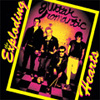 The Exploding Hearts are unabashed disciples of the vibrant,inescapably catchy power pop of bands like The Knack and The Nerves.Mixing the thrust of early punk with the melodic sensibilities ofsixties results in a spirited, irresistible product with a sharp edge.It's evident throughout Guitar Romantic that it isn't a pose, nor is it a joke. These are guys who are on their third or fourth copy of Singles Going Steadycause they wore them out, who wondered what Brian Wilson might havesounded like if he met up with Richard Hell, who know the value of agood, steady finger snap and aren't afraid to use it. This is the musicthey love and it is that passion that makes Guitar Romanticsuch an engaging listen. Don't think that because they pay homage to somany of their influences that there is nothing new on this record. Infact, the Exploding Hearts bring a ferocious energy to their sound,charging headfirst into a crunchy rocker, or soulfully crooning alongwith a backup harmony. "Modern Kicks" opens things up, digging rightin, and guaranteeing that you'll stick around for the rest of album.The lead guitar slices through the fuzzed out production that causesthe instruments to blur and rattle around each other. The mix gives adirty, vintage sound that adds to the personality of the music. Itsounds as if the album had slipped behind a shelf or under a pile ofrecords twenty years ago, only to be rediscovered today as a lost popgem. The bright shuffle of "Sleeping Aids and Razorblades" carries theHearts' soulful romantic persona with clever lyrics like "it's a littleupbeat / and it ain't in tune / you know it's just like this heart ofmine." That line could serve as the tagline for Guitar Romantic,as the Hearts cover the trials and troubles of teenage romance with theresiliently forlorn attitude they deserve, all packaged in a blissfullysweet pop delivery. "Jailbird," a love song about sniffing glue, has adevastatingly hooky chorus, amplified by the call and response backupvocals and a 120 watt guitar melody. You'll find yourself followingalong with every "Yeah, Yeah" and "Woah, Woah." There truly is not aweak song on the entire album. Each track is irresistibly catchy andafter a brief ten songs in twenty-eight minutes, the desire for anotherfix is intense. Guitar Romantic could have easily become justanother nostalgia act looking to knock off the past, but this is farfrom the case. They bring their own tack to a familiar style, imbuingit with a newfound youth and soul. The energy and vitality that theExploding Hearts put out is stunning, their music finely crafted topound even the most jaded music fan into grinning, head bouncingsubmission.
The Exploding Hearts are unabashed disciples of the vibrant,inescapably catchy power pop of bands like The Knack and The Nerves.Mixing the thrust of early punk with the melodic sensibilities ofsixties results in a spirited, irresistible product with a sharp edge.It's evident throughout Guitar Romantic that it isn't a pose, nor is it a joke. These are guys who are on their third or fourth copy of Singles Going Steadycause they wore them out, who wondered what Brian Wilson might havesounded like if he met up with Richard Hell, who know the value of agood, steady finger snap and aren't afraid to use it. This is the musicthey love and it is that passion that makes Guitar Romanticsuch an engaging listen. Don't think that because they pay homage to somany of their influences that there is nothing new on this record. Infact, the Exploding Hearts bring a ferocious energy to their sound,charging headfirst into a crunchy rocker, or soulfully crooning alongwith a backup harmony. "Modern Kicks" opens things up, digging rightin, and guaranteeing that you'll stick around for the rest of album.The lead guitar slices through the fuzzed out production that causesthe instruments to blur and rattle around each other. The mix gives adirty, vintage sound that adds to the personality of the music. Itsounds as if the album had slipped behind a shelf or under a pile ofrecords twenty years ago, only to be rediscovered today as a lost popgem. The bright shuffle of "Sleeping Aids and Razorblades" carries theHearts' soulful romantic persona with clever lyrics like "it's a littleupbeat / and it ain't in tune / you know it's just like this heart ofmine." That line could serve as the tagline for Guitar Romantic,as the Hearts cover the trials and troubles of teenage romance with theresiliently forlorn attitude they deserve, all packaged in a blissfullysweet pop delivery. "Jailbird," a love song about sniffing glue, has adevastatingly hooky chorus, amplified by the call and response backupvocals and a 120 watt guitar melody. You'll find yourself followingalong with every "Yeah, Yeah" and "Woah, Woah." There truly is not aweak song on the entire album. Each track is irresistibly catchy andafter a brief ten songs in twenty-eight minutes, the desire for anotherfix is intense. Guitar Romantic could have easily become justanother nostalgia act looking to knock off the past, but this is farfrom the case. They bring their own tack to a familiar style, imbuingit with a newfound youth and soul. The energy and vitality that theExploding Hearts put out is stunning, their music finely crafted topound even the most jaded music fan into grinning, head bouncingsubmission. Read More

